Views: 8
Yes, Just Make Sure to Use Non-pore-clogging and Non-irritating Makeup

The Essential Info
Acne can lower self-esteem and cause people to feel uncomfortable in social situations.
The best solution is to treat acne, but any effective treatment takes time to yield results. In the meantime, using makeup to cover up acne lesions can counteract the negative psychological effects.
However, it is important to select makeup products that are free of pore-clogging or irritating ingredients. And since physically irritating the skin can lead to more acne, stay exceedingly gentle when you apply it.
Lastly, as soon as you are cleared up, try to go without makeup whenever you can. It’s safer not to use makeup when you have acne.

The Science
- Types of Makeup for Covering up Acne
- Evidence That Makeup Improves Self-esteem in People with Acne
- Choosing the Right Makeup
- Reduce Makeup Use Once Your Acne Clears
Living with acne can damage self-esteem, leading to a lowered sense of one’s own worth and importance.1-4
A paper published in the International Journal of Women’s Dermatology in 2017 analyzed 13 studies looking at self-confidence in acne patients. The researchers concluded that acne lowers the self-image of people in all age groups, especially in women and people suffering from severe acne.

The study authors wrote, “Our research included data from 13 studies conducted in 11 countries…[Acne] affects quality of life and self-esteem across all age groups and cultures.”1
Another study published in the journal Nutrients in 2022 found that women were more likely than men to experience psychological discomfort due to acne.

The study authors wrote, “Women experienced psychological discomfort more frequently than men…and used make-up to conceal lesions.”5
Three other recent studies have also found that acne can lower self-esteem, particularly in teenagers.2-4
Not only that, but teen acne can lead to teasing and bullying, causing further psychological damage.3
Expand to read details of studies

A Brazilian study published in Anais Brasileiros de Dermatologia in 2015 looked at the psychological impact of acne on 355 high school students. The average age of the students was 16. The researchers found that the dominant psychological issue among the students was fear that acne would never cease. The study authors also found that, according to questionnaire responses, high school students with acne reported a lower quality of life than students without acne.2

A study published in the International Journal of Women’s Dermatology in 2018 looked at acne patients between 13 and 19 years of age. The researchers found that more than half of the patients feel embarrassed because of acne, and that females generally feel worse than males. The study also showed that clearing up the acne led to improved self-confidence and decreased social inhibition in most patients.3
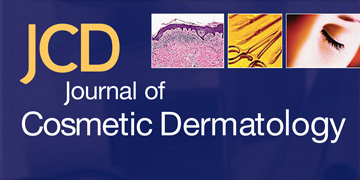
A study published in the Journal of Cosmetic Dermatology in 2022 looked at the impact of acne on patients’ body satisfaction, self-esteem, and quality of life. The study included 192 acne patients older than 15. The researchers found that acne decreases patients’ body satisfaction and quality of life equally regardless of age. However, acne lowers self-esteem in teens more than in adults.4
It is important to treat your acne so that breakouts no longer occur. However, while you wait for your acne treatments to take effect, masking the symptoms of acne with makeup can ease your discomfort in public and raise your self-confidence.
Types of Makeup for Covering up Acne
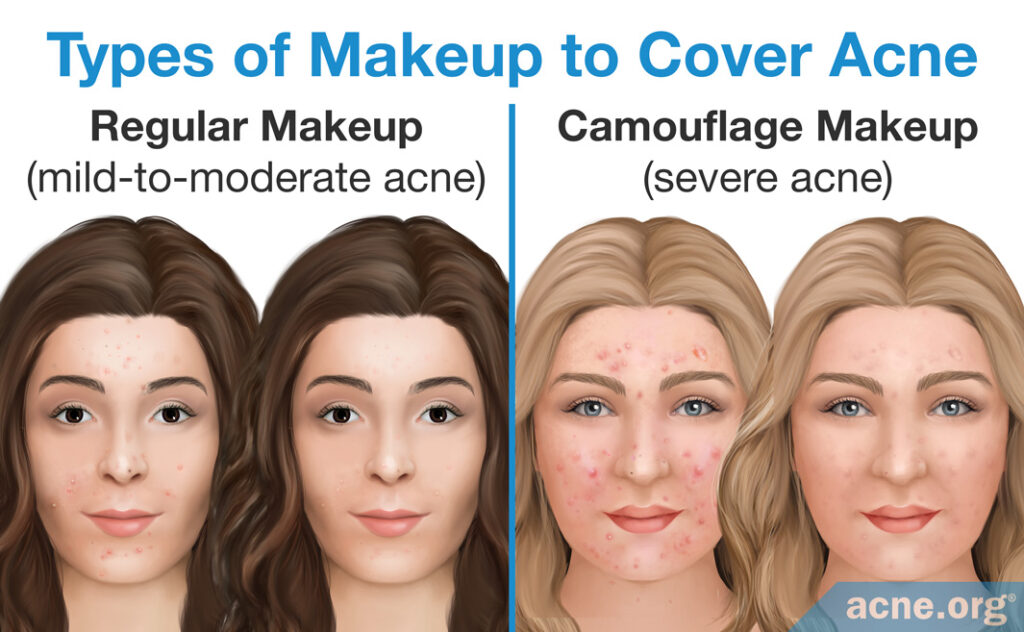
Mild-to-moderate acne: Regular foundations and concealers may be sufficient to cover acne lesions, scars, and/or hyperpigmentation (darkened spots that sometimes remain after acne lesions have healed).
More severe acne: Specialized makeup called camouflage makeup offers a heavier, waterproof option designed to provide more complete coverage. You can tell that a product is camouflage makeup because the label will usually contain either the word “camouflage” or the word “cover”: for example, “camouflaging foundation” or “cover cream.”
Let’s take a closer look at the research showing that makeup can help with self-esteem when you have acne.
Evidence That Makeup Improves Self-esteem in People with Acne
Six studies have shown that using makeup to mask acne lesions and scars can improve a person’s self-esteem and well-being.6-11 While not all the studies used the term “self-esteem,” the researchers assessed patients’ quality of life by asking the patients questions about their self-confidence, their satisfaction with their appearance, and their ability to comfortably engage in social activities. These aspects of psychological well-being are closely tied to self-esteem.
All six studies agreed on the conclusion that makeup can immediately improve people’s psychological well-being while they wait for acne treatments to take effect. Two of the studies also found that patients who received advice on applying makeup from a medical cosmetologist were particularly satisfied with the results.8,10
Expand to read details of studies

The first study, published in the journal Body Image in 2018, looked at whether makeup improves the quality of life of people with various skin disorders, including acne. The study was a systematic review, which means the authors looked at all the research conducted on this topic to date. They concluded that camouflage makeup improves the quality of life of patients with skin disorders. In fact, the authors of the study recommended that doctors encourage patients to use camouflage cosmetics to raise self-confidence.6
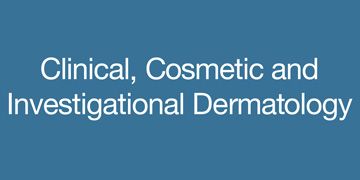
An earlier study, published in the journal Clinical, Cosmetic and Investigational Dermatology in 2012, also reviewed research evidence for the emotional benefits of makeup for males and females with skin conditions such as acne. The study authors concluded that using makeup to cover up skin imperfections caused by acne can provide an immediate emotional benefit and improve patients’ well-being while acne treatment takes longer to yield results.7

Another study published in Clinical, Cosmetic and Investigational Dermatology in 2012 examined the impact of corrective makeup on quality of life in 129 patients with a variety of skin diseases, including acne. Ninety-five percent of the patients were female. A cosmetician instructed the patients on applying corrective makeup. The patients then used makeup for one month and completed questionnaires about their quality of life. After the first use of corrective makeup, 99% of patients reported a noticeable improvement in facial skin, and 88% of patients felt more relaxed in the relationships with other people as a result of applying makeup. The patients stated that the most improved aspects of their lives after corrective makeup use were leisure and daily activities. The authors of the study concluded that corrective makeup significantly improved the patients’ quality of life. They wrote, “This result confirms the importance of self-image for these patients, who have feelings of embarrassment and social inhibition and have an interest in using makeup to restore self-esteem.”8

Another study published in the same journal in 2016 examined the ability of a specific camouflaging cream called Acnacalm®/Acnapur® to cover up acne lesions. Twenty females with acne applied the product to the face for 28 days and completed questionnaires about their satisfaction with the product. Eighty percent of the patients reported that the cream improved the appearance of their skin. In addition, over 90% of the patients agreed or strongly agreed with the statement, “[The camouflage cream] helps you to be happier.”9

An older study published in The Journal of Dermatology in 2006 looked at whether makeup could improve acne patients’ quality of life without disrupting treatment. The authors recruited 50 female patients with acne. Of these, 25 patients received instructions on using cosmetics, while 25 patients were given no specific instructions from dermatologists. Both groups received conventional acne treatment during the study period of four weeks. The patients also completed questionnaires about their quality of life at the beginning and end of the study. The researchers found that the patients who received instructions on using camouflage makeup experienced a greater improvement in their psychological well-being and quality of life. In addition, makeup use did not interfere with conventional acne treatments: neither group showed a noteworthy difference in improvement of acne. The researchers wrote, “Our data are similar to those obtained from other reports…suggesting that makeup use that is instructed and supervised by cosmeticians or dermatologists favorably affects the [quality of life] of acne patients.”10

Finally, a study published in Clinical, Cosmetic and Investigational Dermatology in 2020 tested the impact of a corrective cream on the quality of life of patients with various skin conditions. Out of the 1840 participants in the study, 48.9% or almost half suffered from acne. Ninety-five percent of the study participants were women. The participants applied a corrective cream to their skin twice a day for four weeks. The researchers evaluated the participants’ emotional well-being and functioning before starting to use the cream and at the end of the four weeks. They concluded that the corrective cream had a satisfying or very satisfying impact on the quality of life of 95.8% of participants with acne. The researchers wrote, “In conclusion, dermatologists should continue encouraging their patients regardless of gender or age…to use corrective cosmetics, thus improving skin appearance, well-being and their [quality of life].”11
The take-away message from these studies is that using makeup to camouflage your acne can give an immediate boost to your self-esteem while you wait for your acne treatment to work. However, it is important to select makeup that will not make your acne worse.
Here is what you need to keep in mind when choosing makeup for acne-prone skin.
Choosing the Right Makeup
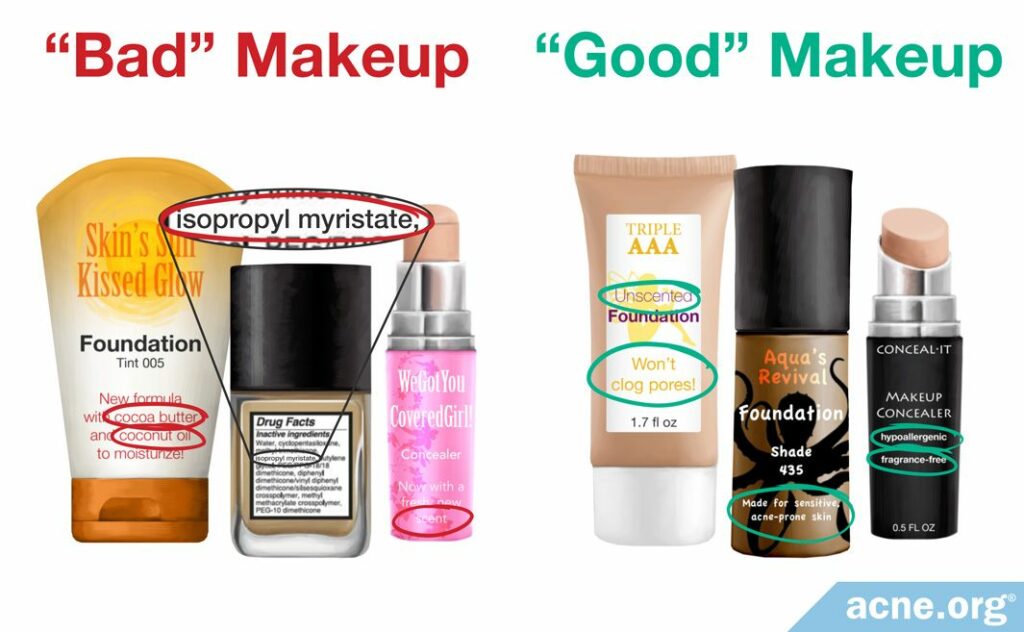
- Avoid makeup with pore-clogging ingredients: The most important thing is to steer clear of cosmetics with comedogenic (pore-clogging) ingredients. The table below provides a comprehensive list of common comedogenic ingredients. Before buying any makeup product, check the label. If any of the comedogenic ingredients listed in the first column are within the first seven ingredients on the label, avoid purchasing the product.
Table of common comedogenic ingredients in makeup
We have compiled two lists of comedogenic ingredients based on a thorough review of the research to date:
- Definitely avoid: These are ingredients that people with acne-prone skin should definitely avoid on the basis of strong evidence showing that these ingredients clog pores
- Consider avoiding: These are ingredients that people with acne-prone skin may want to consider avoiding on the basis of some evidence suggesting that these ingredients may clog pores
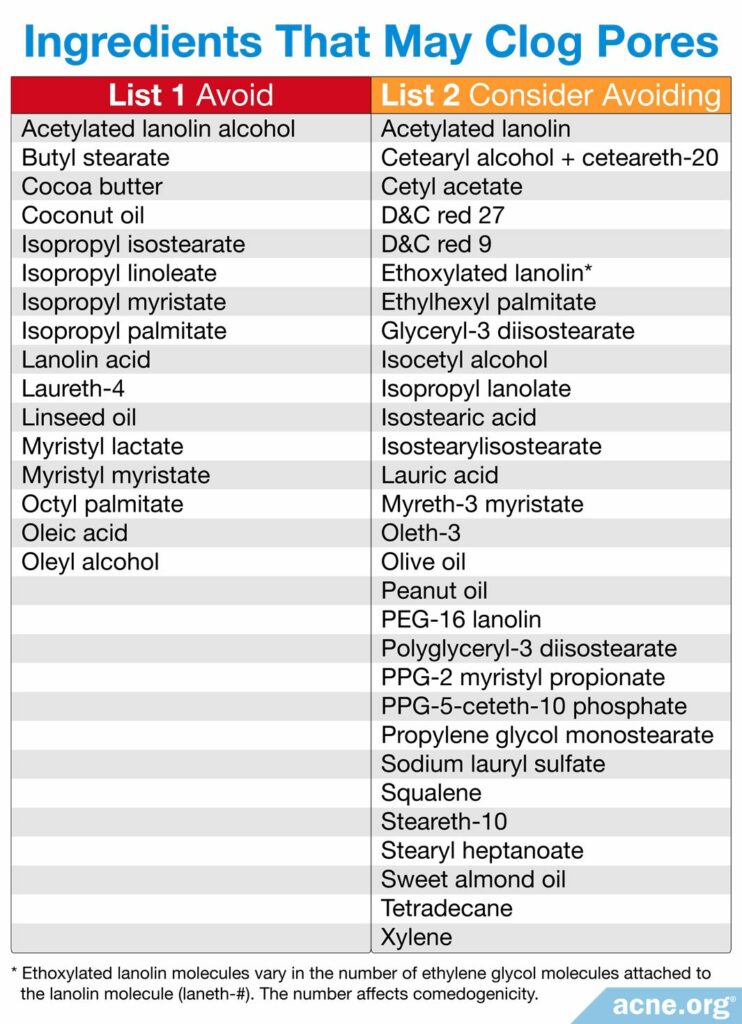
- Avoid makeup containing fragrances or other irritants: Irritation can trigger a breakout or make existing acne worse. It is best to avoid products with fragrances, as these are the most likely ingredients to cause irritation and/or allergies. If you know that your skin is sensitive to a particular ingredient, avoid makeup with that ingredient.
You may need to experiment with different types of makeup to determine what matches your complexion, feels best, and provides the coverage you need.
Reduce Makeup Use Once Your Acne Clears
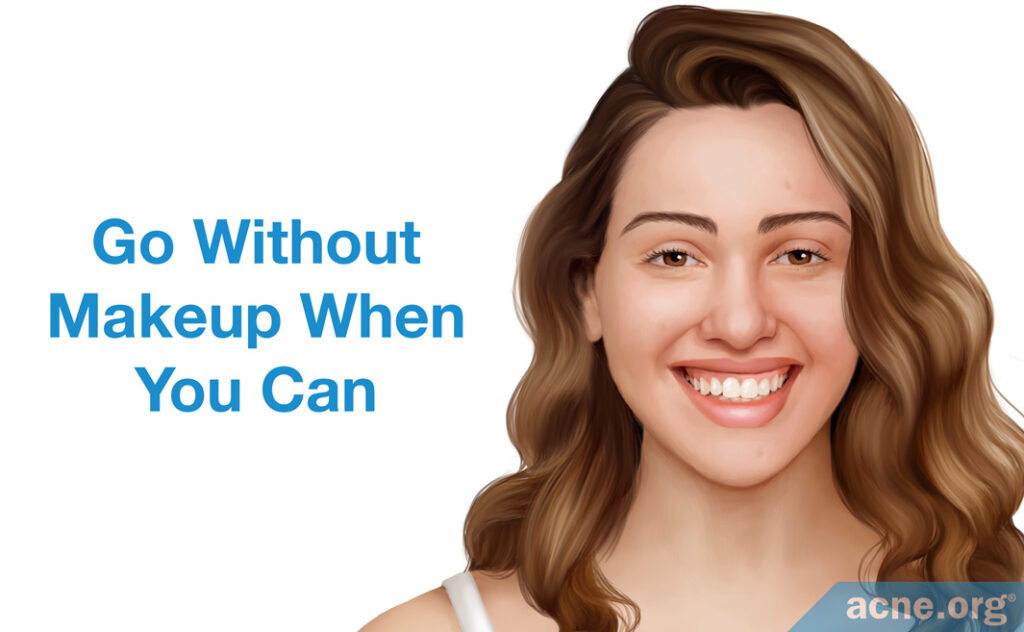
While makeup can boost your self-esteem and confidence while you are treating your acne, it is a good idea to reduce your reliance on makeup once your skin is clear.
Using makeup on acne-prone skin is always a risk, because applying and removing makeup can be an extra source of skin irritation. This physical irritation, in turn, can trigger a flare-up.
In addition, sometimes it is difficult to tell if a makeup product is pore-clogging or contains irritating ingredients, which can make the skin itchy, leading to scratching and more irritation.
Moreover, sometimes it is difficult to fully remove makeup–especially camouflage makeup–and too much makeup left on the skin can prevent acne treatments from being fully absorbed.
To sum up, once your skin is clear, go bare whenever you can.
References
- Gallitano, S. M. & Berson, D. S. How acne bumps cause the blues: The influence of acne vulgaris on self-esteem. Int J Womens Dermatol 4, 12 – 17 (2017). https://www.ncbi.nlm.nih.gov/pubmed/30023422
- Vilar, G. N., Santos, L. A. & Sobral Filho, J. F. Quality of life, self-esteem and psychosocial factors in adolescents with acne vulgaris. An Bras Dermatol 90, 622 – 629 (2015). https://www.ncbi.nlm.nih.gov/pmc/articles/PMC4631226/
- Vivar, K. L. & Kruse, L. The impact of pediatric skin disease on self-esteem. Int J Womens Dermatol 4, 27 – 31 (2018). https://www.ncbi.nlm.nih.gov/pubmed/29872673
- Özkesici Kurt, B. Comparison of the psychosocial impact of acne in adolescents and adults; body satisfaction, self-esteem, and quality of life. J Cosmet Dermatol 21, 836-843 (2022). https://pubmed.ncbi.nlm.nih.gov/33844401/
- Kostecka, M., Kostecka, J., Szwed-Gułaga, O., Jackowska, I. & Kostecka-Jarecka, J. The impact of common acne on the well-being of young people aged 15-35 years and the influence of nutrition knowledge and diet on acne development. Nutrients 14, 5293-5306 (2022). https://pubmed.ncbi.nlm.nih.gov/36558452/
- Kornhaber, R. et al. Cosmetic camouflage improves quality of life among patients with skin disfigurement: A systematic review. Body Image 27, 98 – 108 (2018). https://www.ncbi.nlm.nih.gov/pubmed/30212716
- Levy, L. L. & Emer, J. J. Emotional benefit of cosmetic camouflage in the treatment of facial skin conditions: personal experience and review. Clin Cosmet Investig Dermatol 5, 173 – 182 (2012). https://www.ncbi.nlm.nih.gov/pmc/articles/PMC3496327/
- Seité, S. et al. Interest of corrective makeup in the management of patients in dermatology. Clin Cosmet Investig Dermatol 5, 123 – 128 (2012). https://www.ncbi.nlm.nih.gov/pmc/articles/PMC3459545/
- Monfrecola, G., Cacciapuoti, S., Capasso, C., Delfino, M. & Fabbrocini, G. Tolerability and camouflaging effect of corrective makeup for acne: results of a clinical study of a novel face compact cream. Clin Cosmet Investig Dermatol 9, 307 – 313 (2016). https://www.ncbi.nlm.nih.gov/pmc/articles/PMC5066693/
- Matsuoka, Y. et al. Effects of skin care and makeup under instructions from dermatologists on the quality of life of female patients with acne vulgaris. J Dermatol 33, 745 – 52 (2006). https://www.ncbi.nlm.nih.gov/pubmed/17073988
- Andra, C., Suwalska, A., Dumitrescu, A. M., et al. A corrective cosmetic improves the quality of life and skin quality of subjects with facial blemishes caused by skin disorders. Clin. Cosmet. Investig. Dermatol. 13, 253-257 (2020). https://www.ncbi.nlm.nih.gov/pmc/articles/PMC7125304/
The post Does Makeup Help with Self-esteem When You Have Acne? appeared first on Acne.org.

